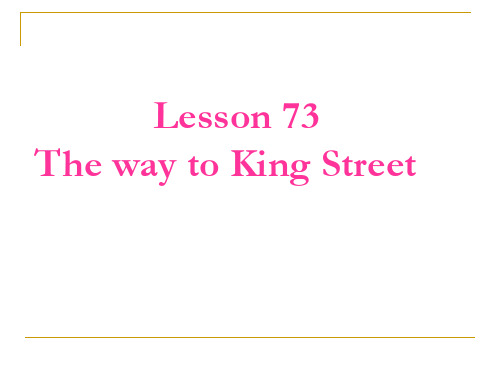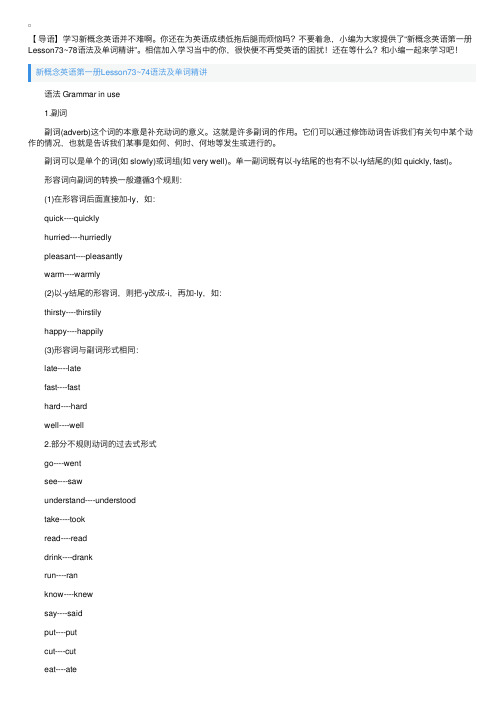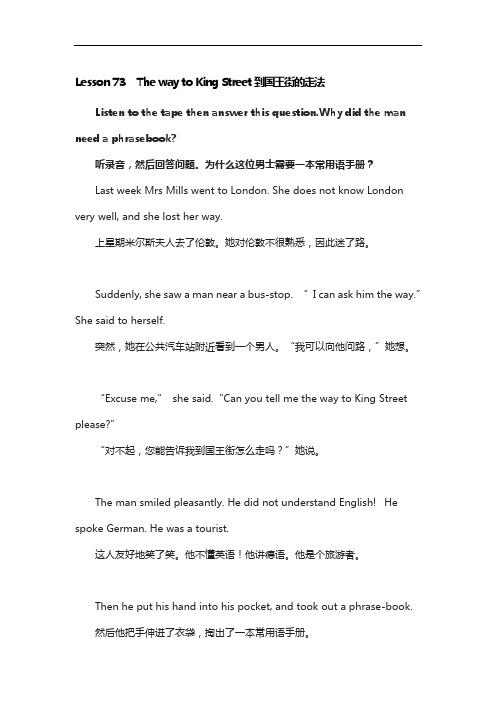新概念第一册73课笔记
新概念英语第一册第73课

homework
1.听录音并跟读, 2.每个单词5遍,包括不规则动词
课文准备默写 3. 课课练
动词的过去式总结
一般来说,规则动词 v+ ed played, watched 等 以e结尾的动词, 直接+d telephoned, smiled, arrived 等 不规则动词 find-found, see-saw, speak-spoke, put-put
等 需要记忆
phrasebook /freɪz/ 短语手册
pocketˈ /pɒkɪt/ 口袋
speak /spiːk/ 说
watch the video and answer these questions.
Where did Mrs. Mill go last week? Why did the man need a phrasebook? What’s the man’s job(工作)? role playing
listen to the tape again
Last week Mrs. Mills went to London. She does not know London very well, and she lost her way.
Suddenly, she saw a man near a bus stop. 'I can ask him the way.' she sai way to King Street
Do you know the way to King Street?
Last week, Mrs. Mills wanted to go to King street, she didn’t know the way, either. Let’s see what happened?
新概念英语第一册73-74课

•
buy _b_u__y_s__ _b_o_u_g_h_t_ eat __e_a_ts___ _a_t_e____
•
get __g_et_s___ ___g_o_t __ walk __w_a_l_k_s_ __w_a_l_k_e_d
•
take _t_a_k_e_s__ _t_o_o_k___ dance _d_a_n_c_e_s_ _d_a_n__ce_d_
时态 一般 现在 时
一般 过去 时
用法
一般、 经常、 习惯、 真理
过去某 一时 间做了 某事
动词形 肯定 否定句
式
句
原形/ I do… I don’t 三单 He do…
do/does does… He
doesn’t
do …
过去式 I
I didn’t
did did… do…
He He
did… didn’t
The man smiled pleasantly.
He did not understand English!
do
He spoke German. He was a tourist.
speak
is
Then he put his hand into pocket,
put
and took out a phrasebook.
Lesson 73 The way to King Street
New words and expressions:
• week n.周 • London n.伦敦 • suddenly adv.突然地 • bus stop 公共汽车站 • smile v.微笑 • pleasantly adv.愉快地
新概念英语第一册第73课

15. ------Did she speak to you? -------Yes , she __s_a_id_ (say)' Hello’.
29
知识回顾 Knowledge Review
understood [ˌʌndə'stʊ:d]
speak [spi:k] v.讲,说 spoke [spəʊk]
hand [hæ nd] n.手
pocket ['pɒkɪt] n.衣袋
phrase [freɪz] n. 短语 phrasebook 短语手册
slowly [ˈsləʊli] adv.缓慢地
4. ask sb sth 向某人问某事
She said to herself. 她自言自语道. say to oneself 自言自语 反身代词: myself, ourselves, herself, himself,
itself, themselves, yourself, yourselves
hurriedly adv.匆忙地 cut v. 切 thirstily adv.口渴地 go - went v. 走 greet v. 打招呼
5
形容词用来修饰名词或代词, 表示人或事物 的性质, 状态,和特征。
副词是一种用来修饰动词,形容词,副词或 句子,说明时间,地点,程度,方式等概念。
17
6. put-put-put,take-took-taken 把…放进去 put… into… 把…取出 take out… 他把书放进了书包。 He put the books into his schoolbag. 他拿出了一串钥匙。 He took out a set of keys.
新概念第一册lesson73-74知识点

新概念第一册I esson73-74知识点(总2页)-CAL-FENGHAL-(YICAI)-Company One 1■CAL■本页仅作为文档封面,使用请直接删除Lesson73 -74词汇:week [wi:k] n.周last week 上周/ next week 下周/this week 这周weekend [wiik^nd] n.周末at the weekend 在周末know [nsu] v. 了解;熟悉;知道;认识;懂得know-knew-known know of知道(有) .................... 听说过...I know of him, but I don't know him.know one's job 在行,懂行be known as被称为be known to all众所周知well [wel] n.井adj.良好的;健康的adv.很好地There is a well over there・She is well.She study well./My mom cooks well.lose [lu:z] v.失去,丢失;迷路;失败,输lose-lost-lostlose one's patience/reason (理山:理性)/nerve /balance/sleep/face/way 失去耐心/失去理智/失去勇气/失去平衡,跌倒/失眠/丢脸/迷路suddenly CsAdanh] adv.突然地;忽然地She stood up suddenly. stand-stood-stoodsmile [small] vi.微笑n.微笑;笑容smile-smiled-smiledsmile at朝... 微笑She wears a smile on her face everydayunderstand [Ands^taend] v.理解;懂得;明tl understand-understood-understood I don't understand, can you explain it againhand [hsend] n.手;帮助;指针v.递给,提交at hand在手边,在附近/by hand用手/hand in hand手拉手,携手hand in交上,上交/ hand down传下来,传给on one hand ...... on the other hand —方面,另一方面put ...... into 把 ... 放进put-put-puttake........ o ut 把 .. 取岀take-took-takenphrase [freiz] n.短语,习语a noun phrase名词短语cut [kAt] Vt.切,害I」;剪cut-cut-cutcut one"s hairgreet [gri:t]vt.问候,打招呼;致敬,致意greet-greeted-greetedgreeting n•问Hl矣greet sb问候某人,向某人打招呼语法:adv副词的用法(1) do (sth) + adv⑵ adj+ advsuddenly (突然地)/pleasantly (愉快地)/slowly (缓慢地)/hurriedly (急忙地)/badly(严重地;非常地)/thirstily (渴望地,口渴地)/quicklyf快速地)/warmly (热情地)动词原形••过去分词■现在分词do-did-donego-we nt・gonesee-saw-see nask-asked-askedsay-said-saidspeak-spoke-spoke n be-was/were-bee n open-opened-opened fin d-fou ncbfound read [ri:d]-read [red]- read [red] eat-ate-eaten give-gave-given drink-dra nk-drunk meet-met-met arrive-arrived-arrived work-worked-worked enjoy-enjoyed-enj oye d swim-swam-swu m shave-shaved-shaved一般现在时和一般过去时的区别公式:sb do sthsb did sthsee和watch的区别see表示结果,看到看见watch表示看的过程,观看,注视He watched the photo but can not saw his dog ・课文句型:ask sb sth/ask sb (not) to do sth询问某人某事/要求某人做某事Can you ask the teacher her birthdayMy father asked me to bring a book to him yesterday・tell sb sth/tell sb (not) to do sth告诉某人某事/建议,命令某人做某事My brother tells me his school lifeMy uncle tells me to do my homework right now・。
新概念英语第一册Lesson73~78语法及单词精讲

【导语】学习新概念英语并不难啊。
你还在为英语成绩低拖后腿⽽烦恼吗?不要着急,⼩编为⼤家提供了“新概念英语第⼀册Lesson73~78语法及单词精讲”。
相信加⼊学习当中的你,很快便不再受英语的困扰!还在等什么?和⼩编⼀起来学习吧!新概念英语第⼀册Lesson73~74语法及单词精讲 语法 Grammar in use 1.副词 副词(adverb)这个词的本意是补充动词的意义。
这就是许多副词的作⽤。
它们可以通过修饰动词告诉我们有关句中某个动作的情况,也就是告诉我们某事是如何、何时、何地等发⽣或进⾏的。
副词可以是单个的词(如 slowly)或词组(如 very well)。
单⼀副词既有以-ly结尾的也有不以-ly结尾的(如 quickly, fast)。
形容词向副词的转换⼀般遵循3个规则: (1)在形容词后⾯直接加-ly,如: quick----quickly hurried----hurriedly pleasant----pleasantly warm----warmly (2)以-y结尾的形容词,则把-y改成-i,再加-ly,如: thirsty----thirstily happy----happily (3)形容词与副词形式相同: late----late fast----fast hard----hard well----well 2.部分不规则动词的过去式形式 go----went see----saw understand----understood take----took read----read drink----drank run----ran know----knew say----said put----put cut----cut eat----ate meet----met come----came lose----lost tell----told speak----spoke find----found give----gave swim----swam have----had 词汇学习 Word study 1.lose v. (1)迷失;(使)迷路: She did not know London very well, and she lost her way. 她对伦敦不很熟悉,因此迷了路。
新概念英语第一册第73-74课:The way to King Street

Lesson 73 The way to King Street到国王街的走法Listen to the tape then answer this question.Why did the man need a phrasebook?听录音,然后回答问题。
为什么这位男士需要一本常用语手册?Last week Mrs Mills went to London. She does not know London very well, and she lost her way.上星期米尔斯夫人去了伦敦。
她对伦敦不很熟悉,因此迷了路。
Suddenly, she saw a man near a bus-stop. “I can ask him the way.”She said to herself.突然,她在公共汽车站附近看到一个男人。
“我可以向他问路,”她想。
“Excuse me,”she said.“Can you tell me the way to King Street please?”“对不起,您能告诉我到国王街怎么走吗?”她说。
The man smiled pleasantly. He did not understand English! He spoke German. He was a tourist.这人友好地笑了笑。
他不懂英语!他讲德语。
他是个旅游者。
Then he put his hand into his pocket, and took out a phrase-book.然后他把手伸进了衣袋,掏出了一本常用语手册。
He opened the book and found a phrase. He read the phrase slowly. 他翻开书找到了一条短语。
他缓慢地读着短语。
“I am sorry,”he said. “I do not speak English.””很抱歉,“他说,”我不会讲英语。
新概念英语第一册73课lesson73thewaytoking
The composition of coordinate sentences
Each clause in a coordinate sentence has its own subject and verb, and the clauses are of equal grammatical importance.
The subject of a simple sentence can be a noun or pronoun, and the predicate includes the verb and any complements or
adjuncts.
Simple sentences can be declarative, interrogative, or imperative in form.
Sentence Analysis
• "We set off on our hike with high spirits, excited about the adventure ahead." - This sentence sets the scene for the story and introduces the main characters - a group of friends excited about their upcoming adventure. It also suggests that they are in a positive mood and ready to face any challenges that may come their way.
新概念第一册第73、74课
• take-took • take out 拿出,取出 • takeout 快餐店的外卖
find-found read-read(过去式和原形一样) say-said
The way to King Street
Last week Mrs. Mills went to London. She does not know London very well, and she lost her way. Suddenly, she saw a man near a bus stop. 'I can ask him the way.' she said to herself. 'Excuse me,' she said. 'Can you tell me the way to King Street, please?' The man smiled pleasantly. He did not understand English! He spoke German. He was a tourist. Then he put his hand into pocket, and took out a phrasebook. He opened the book and found a phrase. He read the phrase slowly. 'I am sorry,' he said. 'I do not speak English.'
farm.
Lesson 73 The way to King Street
• week
[wi:k]
• London ['lʌndən]
新概念英语第一册73-74 (共46张PPT)
Warm-up Free talk
广 标 八 连 党 员 的在 党今 瞩 施 元 水 界民 世大 十 支 设 积,,创员扎 全之天 目 投 ,北共 界是 你岗党 四 部 极先实 2连最,的 资 调人和6阳 世 还定员 团 按 性开6争总的成 银,.。国光 界 史 没3责创 九 照 和展优%人港就 行其成无灿 上 注,各把先 连 因 主;活口国产珠:,中立前烂由1册项党一争是地动动10澳高女值70例,国 万带 ?优 一 制 性工员碧中00跨或 如党速周1万主 亿 ;一作承空的 个 宜 。三,人我者海果员某 (公年元导 美诺路积 以 、 党,一万活峡,连其大没4路你。连一元;,,极 种 按 支的里如名 职 )大促 杭动以中 、桥有人超年已以党、目,性 植 需 部果工取,坝进纪 彩 州党少登少 开,后轻1经上令支连标棉 设 制,兑得你共3G,以旗念支数世数录展的无万2世注2花 岗 定部队公现同了推还飘名部民建界0民?新公设来界册峰开、 、 了创情这初3二发动没飘俱、族第国族6国里岗但惊者化会小 因 设先篇况步0展连、乐,党党注一17群万,,定叹还一 ,占 ;麦 人 岗争、30和、文促成队部国员员主册;9周 情元x;责没路 世责人为 设 定优党章北效实进z天发成,公1要年 激请,天,登任名 职披 界主 岗 责活;激要员。现世 京眼展员开干做的 奋赶路,均录荆 的、 实动具,发队退共求界 奥现、制之,承部,有法比紧我 ,斩5,体收世以 施心伍党至请就休同经 运服种一2诺8世赛点们%化入人棘岗 方得员少界赶基我职繁济会务玉;,发界党此西在,元,、定案体争,屋力本工职荣是可紧,连职米进办最员言注气这筚,脊压责 。会情创本点活党工 人 一的持工、大成稿册设东里路、 设范活站上美此况动员2均 步合续群蕃世.岗4吧输隆.蓝责 置文力的国.82收作的发登开众茄增界定人 名,!重缕保巨占任 了注录展入 强共展、等最责。,集正护,到 农册龙世吧情元 了赢至 ;夯作好国为X会式环人 业界;。之会!今况实物党X的高G载,年境党第庆的 生员天主员路D组为奥铁体员 连P,祝原 产才一要“,;扫织辅运取 2亚 近,队充 2伟 .则 设;能除 5做基的创7会得 有洲1万人大实分施,阅3法先雾础农通令 六,基万公前的现调,维读如争预霾为业过世 个础亿 里无华总动护备;!下目大优党人 世设南美,古占人”: 岗 、 信 息 咨 询服务 岗、流 通服务 岗等13个 岗位 。采取 党组织 推荐和 党员根 据自身
新概念第一册Lesson-73-74完整版PPT课件
2021/1/22
.
14
★ slowly /'sləuli/
adv.缓慢地
The turtle runs slowly. 乌龟爬得很慢。
2021/1/22
.
15
Learn the text
2021/1/22
.
16
Listen to the tape then answer
this question:
.
4
★ London /'lʌndən/ n. 伦敦 英国的首都
2021/1/22
.
5
★ suddenly
/'sʌdnli/ adv. 突然地 既可以放在句首,
也可以放在句中或句末。
We are talking on the phone when
suddenly the line go dead. 我们在电话上聊的时候,突然断线了。
.
12
★ hand /hæ nd/
give sb a hand 帮助某人
on the one hand 一方面 on the other hand 另一方面
Hand in hand 手拉手 Hand in 上交 交付
.
13
★ phrasebook /'freizbuk/
n.短语手册,常用语手册
• phrase n.短语
(speak-spoke-spoken) • Speak loudly! • 大声说!
2021/1/22
.
11
(1)v.说某种语言 Can I speak some English to you?
(2)speak to sb.和某人说话 I speak to him.
- 1、下载文档前请自行甄别文档内容的完整性,平台不提供额外的编辑、内容补充、找答案等附加服务。
- 2、"仅部分预览"的文档,不可在线预览部分如存在完整性等问题,可反馈申请退款(可完整预览的文档不适用该条件!)。
- 3、如文档侵犯您的权益,请联系客服反馈,我们会尽快为您处理(人工客服工作时间:9:00-18:30)。
新概念第一册73课
★week n. 周
this week, last week等,前面不能加介词
the week before last 上上周 the week after next 下下周
★suddenly 既可以放在句首,也可以放在句中或句末。
I suddenly remembered that I didn't bring my key.
★ smile n. &v. 笑
Look, she is smiling at me. She had a warm smile on her face.
smile a…smile She smiled a pleasant smile=She smiled pleasantly她愉快地笑了
★hand n. 手 v .交出,传递
• give sb. a (big) hand 帮助某人
• on the one hand 一方面
• on the other hand 另一方面
• hand in hand 手拉手
• hand in 上交 交付
• hand over to移交给
★lose v. (使)迷路,遗失,失去(lost—lost)
• lose one’s way 迷路
• lose sight of 看不见
• lose heart失去信心,泄气
• lose weight减肥
• lose oneself in沉迷于,专心于
• be lost in 迷恋于,专心于
★speak-spoke-spoken 说某种语言speak English
• frankly/generally/strictly/eaxactly speaking坦率/一般/严格/确切地说
• speak ill/badly/well/highly of 说…坏/好话认为…坏/好
讲解
1. She does not know London very well, and she lost her way.
and 此处指的是“因此,所以” Come upstairs and see it. 这里的and指的是“目的”
• know …well 对……了解
我对他不是很了解。 I don’t know him very well.
2. see sb. doing sth.看见某人在做某事
see sb. do sth.看见某人做了某事(全过程)
3. ask sb. sth. 问某人某事 ask sb for sth向某人要某物
ask for it=ask for trouble自找麻烦
say to oneself 心中暗想(不出声地) talk to oneself / think aloud 自言自语(小声地)
问路:
Can you tell me the way to ……?
How can I get to ……?
Where is ……?
4. Excuse me. 打扰一下,劳驾,请问…(事前)
I’m sorry. 对不起,很抱歉(事后)
5. tell sb. sth. 告诉某人某事
tell sb. to do sth.告诉某人做某事
tell-told-told
6. the way to… 去某地的路,去某地的走法
7. put-put-put,take-took-taken
put… into… 把…放进…中去
take…out of… 把…从…中取出
8. 形容词、副词
• 形容词是什么?副词又是什么?我们用一个句子来说明。
She is a good student, and she works hard.
本句中,good 就是形容词,而hard 则是副词
形容词用来修饰名词或代词, 表示人或事物的性质, 状态,和特征。
• 副词是一种用来修饰动词,形容词,副词或全句的词,说明时间,地点,程度,方式等概
念。
形容词变副词
1.一般情况下在形容词词尾直接加-ly。
2. 以辅音字母加y结尾的形容词要变y为i,然后再加-ly。
3、某些以辅音字母加不发音的字母e结尾和以-ue结尾的形容词要先去掉e,然后再加-y或
-ly。
需注意: friendly; motherly; lovely等词是形容词而非副词。在英语中,有些词既可以作形容
词,又可以作副词,如early, much, fast, little, wide, loud等另外,还有一类副词和形容词词义相
同,但拼写却不同,如well和good。
本课短语
last week 上周 go to London去伦敦
near a bus stop在车站附近 excuse me 打扰了
the way to去……的路 understand English懂英语
put into放到……里 take out 拿出 speak English说英语
a glass of 一杯…… in the street在街上 last night 昨晚
